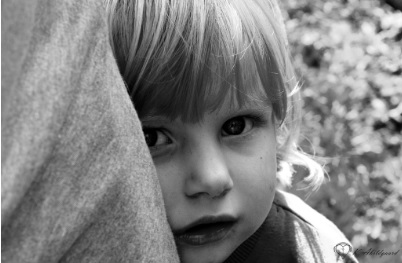
Social Anxiety vs. Shyness
Oftentimes, people don’t realize the difference between social anxiety and shyness. They assume the two words are synonyms, interchangeable in meaning. But that belief is a myth. Shyness is a characteristic of one’s personality, while social anxiety is an anxiety disorder recognized by the National Institute of Mental Health or NIMH.
“She’s Just Shy”
 As a child, my parents called me shy. They felt that the way to deal with this “problem” was to shove me, unwillingly, into awkward public situations. I was told to sing in the choir, give a speech in front of the church congregation, and audition for the school play, among other things.
As a child, my parents called me shy. They felt that the way to deal with this “problem” was to shove me, unwillingly, into awkward public situations. I was told to sing in the choir, give a speech in front of the church congregation, and audition for the school play, among other things.
I did not do well. I would panic when placed in new situations. I would falter when required to speak – or perform – in front of a crowd.
My parents felt that being shy was a fault that could be fixed. They assumed that pushing me to be sociable would make me so. Maybe it was because everyone else in my family was outgoing. Or maybe it was just how things were done back then.
Regardless of the reasons behind their actions, I was an introvert and no amount of pushing would change that. It wasn’t until I became an adult that I realized I was more than just shy.
What’s It Mean to Be Shy?
 Shyness is a behavior pattern, not a mental disorder. People who are shy feel inhibited in certain social situations. Perhaps they can’t verbalize their thoughts properly. Perhaps they’re worried about saying the wrong thing or acting the wrong way. Oftentimes, they’re concerned about what people think of them or fear that others are judging their words or actions.
Shyness is a behavior pattern, not a mental disorder. People who are shy feel inhibited in certain social situations. Perhaps they can’t verbalize their thoughts properly. Perhaps they’re worried about saying the wrong thing or acting the wrong way. Oftentimes, they’re concerned about what people think of them or fear that others are judging their words or actions.
People who are shy are aware that they are timid. They wish they weren’t. They want to be able to express themselves and interact appropriately in social situations.
What is Social Anxiety?
A social anxiety disorder, on the other hand, is marked by an inability to perform in social situations. For instance, being unable to go to the mall, make a phone call, speak to an authority figure, or perform in a group. It is not just a dislike or fear. It is intense.
Those suffering from social anxiety disorders often feel physical symptoms associated with panic attacks – racing heart, labored breathing, and sweaty palms, for instance. Generally, the intensity of the attacks are what separate shyness from social disorders. They may include psychological symptoms, such as an inability to think clearly or a “flight” response, and sometimes signs appear at just the thought of being in public.
Social anxiety disorders can be debilitating, causing an individual to cut themselves off from all contact with the outside world.
I used to joke that I was a hermit. I stayed at home. I shopped online. I sent my husband for groceries or other necessities. I hated driving. I would not – could not – go to the mall. I hated making phone calls. In fact, I’d practice before calling almost anyone, even if it was just to order a pizza.
I often realized the absurdity of my own fears. I had friends who I spoke to regularly online, but felt real fear at the mere idea of speaking to on the phone. Why? I don’t know. I adored shopping for holiday gifts, but panicked when forced to interact with other people in the store, even when just checking out. Driving, especially to somewhere new, scared me to no end.
I am often required to do things which place me face-to-face with my fears. Sometimes the experience ends uneventfully. Yet if something goes wrong, for instance I make a wrong turn; I overreact and feel the tears in my throat, choking my voice.
Thankfully, I now surround myself with people who understand that I have social anxiety. I am no longer required to sing in public or make speeches. I have chosen a career in writing, where people can read what I could not say out loud.
Do you have a social anxiety disorder? http://www.socialanxietysupport.com/disorder/liebowitz/